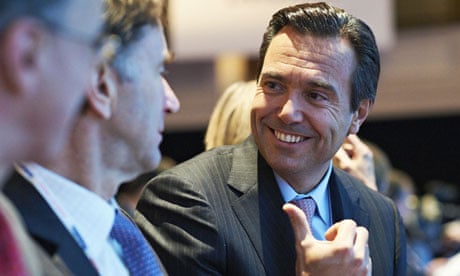The loss-making Lloyds Banking Group is poised to reignite rows over executive excess and rewards for failure by giving a £1.4m bonus, on top of £1m basic salary, to its chief executive, António Horta-Osório.
The remuneration committee of the bank, which was bailed out with £21bn from the taxpayer in 2008, meets next week to recommend the payout despite Lloyds being expected to report a loss for 2012 of more than £500m.
The bosses of Barclays and Royal Bank of Scotland, Antony Jenkins and Stephen Hester, have waived their 2012 bonuses and Lord Oakeshott, the former Liberal Democrat Treasury spokesman, said last night that Horta-Osório should do the same.
The peer, who resigned from the government believing it too soft on the banks, said it would not be appropriate for Horta-Osório to receive any extra payout until there was more tangible evidence of Lloyds' contribution to supporting small and medium-sized businesses.
The bank, which remains 40% state-owned, would not comment publicly and insisted privately that no decision had yet been made about the chief executive's payout, but sources confirmed that a figure of around £1.4m was under consideration, to be paid in shares and deferred until the taxpayer broke even on its stake.
Lloyds is understood to have taken soundings from the government on the payout to ensure it will not face immediate opposition from ministers.
Friends of the Portuguese-born chief executive pointed out that he played no part in the payment protection insurance (PPI) scandal, which had done most damage to the bank's 2012 financial figures, to be formally released on 1 March.
They also noted that the bank boss has presided over an increase in business loans and an astonishing bounceback in the Lloyds share price, which outperformed all other members of the FTSE 100 index of leading companies.
"The maximum he [Horta-Osório] is eligible for is 225% of his annual salary which would be £2.3m and he has very tough financial and non-financial targets to meet, including lending to small businesses. Most people believe he has had a good year," said one friend, who thought £1.4m would be a reasonable payout in the circumstances.
But critics pointed out that the UK's financial regulator has just fined Lloyds £4.3m for delays in compensating customers for mis-sold PPI policies while they also complain the executive bonus and wider remuneration structure is too opaque.
"Lloyds are making the right noises on net business lending but there is no evidence of it yet in the official funding for lending figures. It's a taxpayer controlled bank so Mr Horta-Osório's contract should be totally transparent with any bonus deferred until Lloyds has delivered for British business," said Oakeshott.
Most analysts are expecting the bank to announce pre-tax losses of £544m for 2012 after having set aside £2bn in the year to compensate customers mis-sold PPI policies. The equivalent statutory loss for the previous year was £3.5bn.
The PPI problems, which have so far cost Lloyds £5.3bn in provisions, took place before Horta-Osório arrived from rival Santander UK two years ago. The group's underlying pre-tax profits for last year are expected to come in at £2.4bn, up from £638m in 2011.
The Lloyds boss waived his bonus for the year before last, a decision made easier by the fact that he took an eight-week break from work suffering from exhaustion.
Meanwhile the Lloyds annual losses will look good when compared with an almost £4bn deficit expected to be announced by RBS when it provides its figures on 28 February.
RBS, which is 81% owned by the state after a £45.5bn billion bailout at the height of the financial crisis, disclosed last November that it was taking an additional £400m hit for claims relating to PPI.
The bank also revealed that another £50m was needed to cover a computer system failure which left millions of people without access to their accounts.
Hester said last year he would waive his annual bonus after the bank's IT collapse, but next month he is in line for around £780,000 in shares, which can be cashed in 12 months later, as part of a reward scheme for his performance in 2010.
